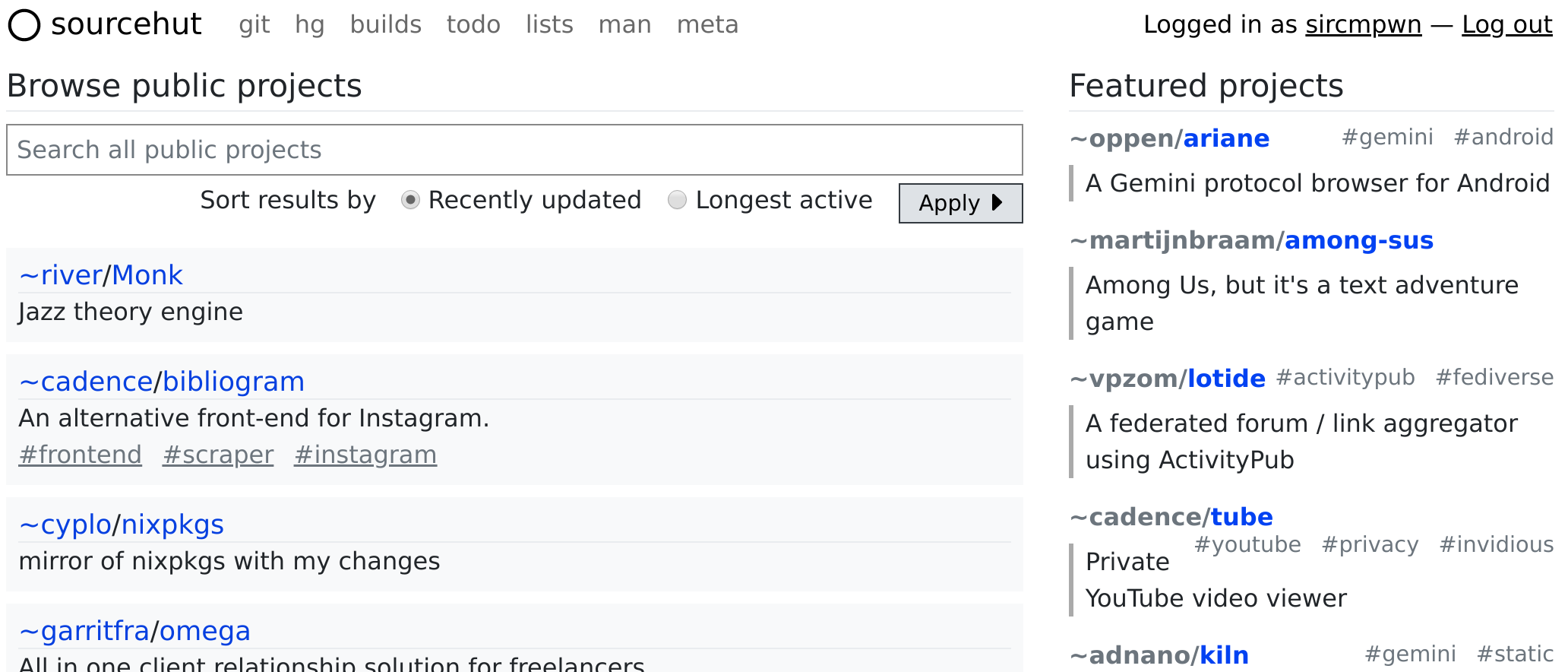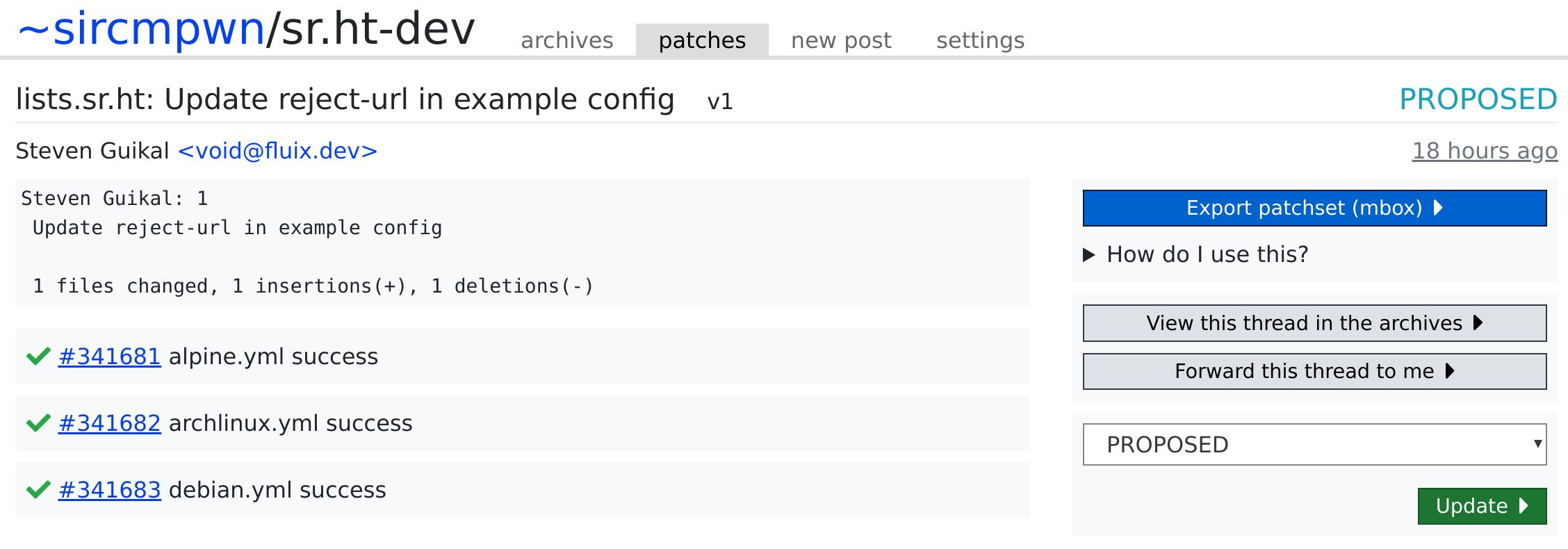Today is the second anniversary of SourceHut being made available to the general public during its alpha phase of development, and the end of the fourth year of development. What a year it’s been! If only I could send a warning to the younger me who wrote last year’s article. As the second anniversary comes around, despite the trials we’ve endured this year, I feel positive about our accomplishments.
One year ago, I wrote that I expected SourceHut to enter its beta phase in 2020, and I was wrong. However, we do have a well-defined, finite list of action items to be completed before we can kick off the beta. We hit a lot of important development milestones this year, and we’ll put the cherry on top in 2021.
This month’s public Mumble conference will take place tomorrow (the 16th) at 17:00 UTC, in the sourcehut room on voice.mnus.de, port 64738. Please join us to celebrate our second year, and ask any questions or provide any feedback that you might have about sourcehut.
Let’s take a moment celebrate our accomplishments in 2020, and lay out our plans for 2021.
2020 in summary
Here are some of the more important things we got done:
- The project hub
- Initial GraphQL APIs for meta.sr.ht, git.sr.ht
- git.sr.ht release artifacts, git blame & path logs
- builds.sr.ht job artifacts, RSS feeds
- lists.sr.ht CI integration
- todo.sr.ht tracker data import/export
- Public access to operations data & documentation
And some of the numbers for 2020:
- 7,344 users signed up
- 1,447 mailing lists established; 37,164 emails sent
- 2,024 bug trackers and 9,210 tickets filed
- 15,754 git repositories and 2,662 hg repositories made
- 233,000 build jobs completed
- 2× increase in revenue
And, 2,000 projects on the brand-new project hub! You can browse the 723 public projects right here. Some notable projects which started using SourceHut this year include:
- Dozens of Gemini projects started on sr.ht this year
- sr.ht is the home of the Plan 9 renaissance
- The Zrythm Digital Audio Workstation moved in
- vis and mutt set up sr.ht mirrors and CI
- alacritty and Nim rigged up our CI
- More in this thread and this thread
We’ve also contributed to many FOSS projects upstream, including:
- git send-email improvements
- Mercurial patches
- Linux documentation patches
- New pygit2 and libgit2 features, and financial support
- musl financial support
- Redis vulnerability reported & fixed
- PeerTube financial support
And our engineers, under the open-ended directive of “make FOSS better”, have contributed to Wayland, Mesa, Vulkan, Go, the Linux kernel, IRCv3, Gemini, and more. Our FOSS consulting arm has produced 100% free-software output in Mesa, Xorg, and more, and built a brand-new FOSS webmail, for clients like Valve Software and Migadu.




Expectations for 2021
Well, I’ll go ahead and make the same ill-fated prediction this year: the beta will begin sometime in 2021. One of the blockers I mentioned last year still remains to be completed — user groups/organizations — but the main blocker is the completion of API 2.0. I’ve also added “beta” labels to all of our bug trackers, if you want to explore the fine details of what features and bugs are considered blockers.
The business and operational goals laid out in last year’s post have been met. The only business-related blocker is determining how the long-promised pricing changes will take shape when the beta begins, which will be heavily influenced by the ultimate implementation of user groups. Of course, the community will be involved in every part of this discussion. And, as always, I’ll re-iterate that the plan is not to price users out of the service — those who are unable to afford payments, as always, will be issued free service.
The API 2.0 efforts are of particular importance for the beta. Their completion will be necessary to establish an API that we can be confident in supporting for many years into the future, and enable us to expand the services and their awareness of one another to any degree we please. The performance, scalability, and reliability of our services is also expected to increase substantially with the completion of API 2.0.
We also made substantial progress on data ownership — you can now export and import almost all of your data on sourcehut, much of it in standard formats — but we also want to expand on this by implementing self-service account deletion and renames, and a unified solution for downloading all of your data at once.
So, in short, we have this to look forward to for the beta:
- User groups/organizations
- API 2.0 completion
- Improvements to the cross-service awareness
- Completion of data ownership goals
We still have a lot of work on the horizon, but we have a well-laid plan towards the finish line and the start of the beta phase. Once the beta begins, we’ll focus on refining our model, flushing out bugs, improving our already best-in-class performance and reliability, and establishing enough confidence in the system to declare it production ready.
SourceHut has much higher standards for production readiness than most software. Many users are already enjoying SourceHut as the platform of choice for their own production-ready projects, and we already make stability and security guarantees which many would consider necessary as such. But we’re not going to declare our system production ready until we’ve well exceeded the standards of the industry — we want the best performance, the best reliability, and we want to leave a wide margin for everyone else to catch up. We’re only going to declare it production ready when we’re far ahead of the pack and prepared to support all of our features and users for decades to come. SourceHut will be “production ready” when it’s prepared to become the bedrock of free software, and not before.
What’s cooking on SourceHut? November 2020
Now, for your regularly scheduled status update, I’ll keep it brief. Most of the work has been behind the scenes, on API 2.0.
meta.sr.ht
- gemini:// and gopher:// URLs are now permitted for profile URLs
builds.sr.ht
- nixos/20.09 is now available
- openbsd/6.8 is now available
- ubuntu/20.10 is now available
- freebsd/12.x has been updated to FreeBSD 12.2